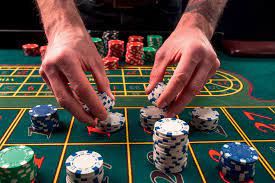The first step in learning how to quit gambling is recognizing the negative consequences of your addiction. While these effects are painful, they can also act as a powerful motivational tool. Another key component is setting specific goals. Setting goals that are measurable and time-based will increase your chances of success. By identifying these goals, you can make each day count, and create a positive cycle that builds upon itself.
Setting goals and sticking to them will help you focus on overcoming the problem. It is important to acknowledge your problem to your family and friends so they can support you. In addition, you must take steps to limit the amount of money you spend on gambling. This can be done by setting a budget and sticking to it.
Another key to quitting gambling is to recognize that the feeling of defeat will likely be a strong trigger for your addiction. If you feel defeated, you may increase your wagers to make up for lost money. In some cases, people who are unable to stop gambling use money they don’t have for bills or children’s necessities. Some people even borrow or sell things to fund their gambling habit.
Once you’ve acknowledged that you have a gambling addiction, writing a contract with yourself will be extremely helpful in your quest to kick the habit. This will make you feel accountable and real for your decision. Writing things down will also make you better understand why you’re addicted to gambling. Even though it might be difficult to admit your addiction, many others have overcome it and are now living a life free from the addiction.
Another step towards quitting gambling is to engage in other activities. Hobbies are a great distraction from the urge to gamble. By spending more time in other activities, you’ll be able to focus on healthier habits. Besides, they help you socialize with others and hold yourself accountable. As long as you can find other activities to keep yourself busy, you’ll be on your way to overcoming your addiction.
Hobbies are great outlets for your energy. They create endorphins and are a pleasant outlet for your mind and body. Gambling is a form of entertainment, but it can also lead to serious financial and health problems. It’s therefore important to find alternatives or find professional help if you have trouble quitting gambling.
Compulsive gambling is a mental health problem. It can affect your finances, your relationships, and your self-confidence. Fortunately, you can learn to recognize and overcome these symptoms and take steps to overcome your addiction. You can also get help by working on adjusting your lifestyle and improving your mental health.
The first step in learning how to quit gambling is to decide that you’re ready to do so. Make sure you have the time and resources to commit to stopping your addiction. In addition, try to identify other activities you enjoy. If you’re accustomed to gambling on the Internet, you should find alternative ways to occupy your time. Similarly, if you spend a lot of time on your smartphone, you might want to switch to another activity.





